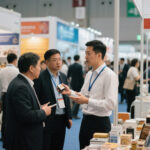In the dynamic landscape of international trade, China has firmly established itself as the “world’s factory,” offering a vast array of products at competitive prices. However, navigating the Chinese sourcing market can be a complex and challenging task for buyers, especially those new to the scene. This is where China sourcing agents come in. In this blog post, we will address the top five questions that buyers often have about China sourcing agents, shedding light on their role, services, and how to find reliable partners.
What is a Sourcing Agent?
A sourcing agent is a professional intermediary who acts on behalf of buyers to source products, suppliers, and negotiate deals in a specific market, in this case, China. Think of them as your local guide in the vast and intricate maze of Chinese manufacturing and trading. They leverage their in – depth knowledge of the local market, industry connections, and language skills to bridge the gap between international buyers and Chinese suppliers.
Sourcing agents are not just middlemen; they are strategic partners. They understand the nuances of the Chinese business culture, which can be vastly different from that in other parts of the world. For example, building guanxi (relationships) is highly valued in Chinese business, and sourcing agents are well – versed in how to establish and maintain these crucial connections on behalf of their clients.
What Does a Sourcing Agent Do?
Supplier Identification and Vetting
One of the primary functions of a sourcing agent is to identify potential suppliers that meet the buyer’s specific requirements. This involves conducting extensive market research, scouring through trade shows, online platforms, and industry directories. But it doesn’t stop at just finding suppliers; the agent then vets them thoroughly.
Vetting includes checking the supplier’s production capacity, quality control processes, financial stability, and compliance with international standards. For instance, if a buyer is looking for suppliers of electronic products, the sourcing agent will ensure that the suppliers have the necessary certifications such as CE, FCC, or RoHS. They may visit the supplier’s factory in person, taking photos and videos, and interviewing the management and workers to get a comprehensive understanding of the supplier’s operations.
Negotiation
Sourcing agents are skilled negotiators. They know the ins and outs of the Chinese market prices and are able to negotiate favorable terms on behalf of the buyer. This includes not only the product price but also payment terms, minimum order quantities (MOQs), delivery schedules, and after – sales service.
For example, they can negotiate for a lower price by leveraging their relationship with the supplier or by pointing out competitors’ offers. They can also work to reduce the MOQ, which is especially beneficial for small – to – medium – sized businesses that may not have the capital or storage space to order large quantities initially. In terms of payment terms, they may be able to secure more flexible options such as partial upfront payment and the balance upon delivery, rather than the supplier’s standard full – upfront payment requirement.
Quality Control
Ensuring product quality is a top priority for sourcing agents. They can arrange for pre – production samples to be sent to the buyer for approval. Once production begins, they can conduct on – site inspections at various stages, such as during raw material inspection, in – process inspection, and final product inspection.
If any quality issues are detected, the sourcing agent will work with the supplier to resolve them promptly. This could involve reworking the products, replacing defective parts, or even canceling the order if the issues are severe. They also ensure that the products meet the buyer’s specific quality standards, whether it’s in terms of product specifications, packaging, or labeling.
Logistics and Shipping
Sourcing agents handle the complex logistics involved in getting the products from the Chinese factory to the buyer’s destination. They can arrange for transportation, including sea freight, air freight, or rail freight, depending on the buyer’s requirements and budget.
They also deal with customs clearance, ensuring that all the necessary documentation is in order and that the products comply with the import regulations of the destination country. For example, they will prepare commercial invoices, packing lists, certificates of origin, and other required documents. In addition, they can monitor the shipping process, providing the buyer with regular updates on the status of their order, from when it leaves the factory until it arrives at the port or airport of destination.
Who Needs a Sourcing Agent? (5 Types)
Small – to – Medium – Sized Enterprises (SMEs)
SMEs often lack the resources and expertise to handle international sourcing on their own. They may not have a dedicated procurement team, and the cost of sending employees to China for sourcing trips can be prohibitively high. A sourcing agent can act as an extension of their business, handling all aspects of the sourcing process at a fraction of the cost.
For example, a small clothing brand may want to source unique fabrics and clothing items from China. A sourcing agent can find suitable suppliers, negotiate prices, and ensure quality, allowing the brand to focus on design, marketing, and growing their business.
E – commerce Entrepreneurs
With the boom of e – commerce, many entrepreneurs are looking to source products from China to sell on platforms like Amazon, eBay, or their own online stores. However, sourcing products from China for e – commerce has its own set of challenges, such as dealing with small order quantities, fast shipping requirements, and strict quality control for online reviews.
Sourcing agents can help e – commerce entrepreneurs find reliable suppliers who are willing to work with small orders, negotiate for faster production times, and ensure that the products are of high quality to avoid negative reviews. They can also handle the logistics, ensuring that the products are shipped in a timely manner and arrive in good condition.
Start – ups
Start – ups often operate on tight budgets and have limited time and resources. Sourcing agents can help start – ups find cost – effective suppliers in China, saving them both time and money. They can also provide valuable insights and advice on product development, helping start – ups refine their product ideas and find the right suppliers to bring them to life.
For instance, a tech start – up developing a new gadget may need to source components from China. A sourcing agent can assist in finding suppliers who can provide high – quality components at an affordable price, as well as help with the assembly process if required.
Retailers
Retailers, especially those with a wide range of product offerings, need to source products from multiple suppliers. Sourcing agents can simplify this process by acting as a single point of contact for all their sourcing needs in China. They can source products from different suppliers, coordinate production schedules, and ensure that all products are shipped together, reducing shipping costs and streamlining the supply chain.
For example, a large department store may source everything from clothing and electronics to home decor items from China. A sourcing agent can manage the relationships with different suppliers, negotiate prices, and handle the logistics for all these products, making the sourcing process more efficient for the retailer.
Manufacturers Looking for Components or Raw Materials
Manufacturers who rely on components or raw materials from China can benefit from sourcing agents. These agents can help manufacturers find reliable suppliers of high – quality components at competitive prices. They can also ensure that the components are delivered on time, which is crucial for maintaining production schedules.
For example, an automotive manufacturer may need to source specialized parts from China. A sourcing agent can find suppliers who meet the manufacturer’s strict quality and technical requirements, negotiate favorable terms, and handle the shipping and customs clearance of these parts.
What about China Sourcing Agent Fees?
The fee structure for China sourcing agents can vary depending on several factors, such as the scope of services, the complexity of the project, and the volume of business. There are generally three main types of fee models:
Percentage – based Fees
Many sourcing agents charge a percentage of the total order value. This percentage typically ranges from 5% to 15%, but it can be higher or lower depending on the nature of the products and the level of service required. For example, if a buyer places an order worth \(100,000 and the sourcing agent charges a 10% fee, the agent’s fee would be \)10,000.
This model is beneficial for buyers as it aligns the interests of the sourcing agent with their own. The agent has an incentive to negotiate the best price for the buyer because a lower product price means a lower fee for them as well. However, buyers should be aware that some agents may inflate the product price to increase their own earnings, so it’s important to do due diligence and compare prices.
Fixed – fee Model
In some cases, sourcing agents may charge a fixed fee for their services. This is often used for specific tasks or projects, such as conducting a supplier audit or handling a one – time order. For example, an agent may charge a fixed fee of $500 to visit a supplier’s factory and conduct an inspection.
The fixed – fee model provides clarity and predictability for buyers, as they know exactly how much they will be paying for the service. It is also suitable for smaller projects or tasks where a percentage – based fee may not be practical.
Hybrid Model
Some sourcing agents use a hybrid fee model, which combines elements of both the percentage – based and fixed – fee models. For example, an agent may charge a lower percentage – based fee on the order value plus a fixed fee for additional services such as quality control inspections or customs clearance. This model offers flexibility and can be tailored to the specific needs of the buyer.
When considering sourcing agent fees, buyers should not only focus on the cost but also on the value that the agent can provide. A reliable sourcing agent can save buyers money in the long run by negotiating better prices, avoiding costly mistakes, and ensuring product quality.
How to Find Reliable Sourcing Agents?
Referrals and Recommendations
One of the most reliable ways to find a sourcing agent is through referrals from trusted business contacts, industry peers, or trade associations. If someone you know has had a positive experience with a sourcing agent, they are likely to recommend them. You can also join online forums and communities related to international trade and ask for recommendations from other members.
For example, if you are a member of an e – commerce association, you can post a question asking for recommendations for reliable sourcing agents in China. Other members who have experience in sourcing from China may share their insights and suggest agents they have worked with.
Online Directories and Platforms
There are several online directories and platforms that list sourcing agents in China. Websites like Alibaba, Global Sources, and Made – in – China often have a section for sourcing agents. These platforms usually provide basic information about the agents, such as their company profile, services offered, and customer reviews.
However, it’s important to note that not all agents listed on these platforms are equally reliable. You should carefully review the agent’s profile, read customer reviews, and check their certifications and accreditations. Some platforms also offer verification services, which can help you identify more trustworthy agents.
Trade Shows
Attending trade shows, such as the Canton Fair in Guangzhou, is an excellent way to meet sourcing agents in person. Trade shows provide an opportunity to have face – to – face conversations with agents, learn about their services, and assess their professionalism and expertise.
You can also visit the booths of different agents, ask for references, and get a feel for their business operations. Meeting agents at trade shows allows you to build a personal connection, which can be the foundation of a long – term and reliable business relationship.
Interview and Due Diligence
Once you have shortlisted a few sourcing agents, it’s important to conduct interviews and due diligence. During the interview, ask about their experience in your industry, their network of suppliers, and their approach to quality control and negotiation.
Request references from their past or current clients and follow up with these references to ask about their experience working with the agent. You can also check the agent’s business registration, financial stability, and any legal issues or complaints against them. A thorough due diligence process will help you identify reliable sourcing agents who can meet your business needs.
In conclusion, China sourcing agents play a vital role in facilitating international trade between buyers and Chinese suppliers. By understanding what they do, who needs their services, how they are compensated, and how to find reliable partners, buyers can make informed decisions and leverage the benefits of sourcing from China. Whether you are a small – business owner, an e – commerce entrepreneur, or a large – scale retailer, a reliable sourcing agent can be the key to a successful sourcing experience in China.










Leave a Reply